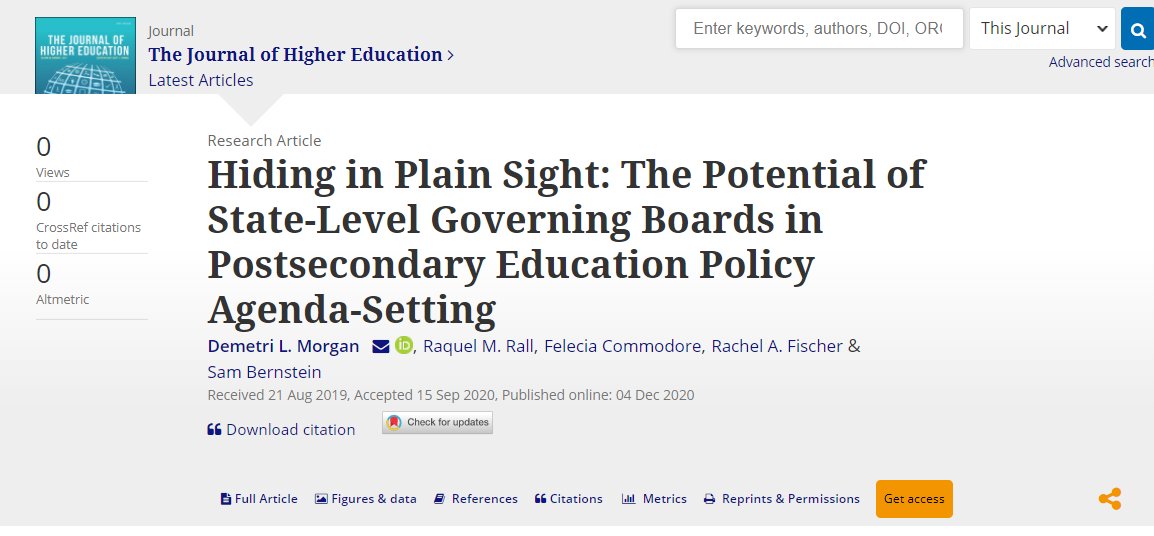
 New pub alert: Excited to share some of our latest in @JHE_Editors from @DoctorRaq, @FeleciaElana, and I along with a @LoyolaSOE graduate student at the time and a recent alum of @MCEatDU who @CeciliaOrphan connected me to!
New pub alert: Excited to share some of our latest in @JHE_Editors from @DoctorRaq, @FeleciaElana, and I along with a @LoyolaSOE graduate student at the time and a recent alum of @MCEatDU who @CeciliaOrphan connected me to!https://www.tandfonline.com/doi/ref/10.1080/00221546.2020.1824885?scroll=top
A thread summary in 12 tweets: In the manuscript, we seek to reposition how #highered #policy scholars conceptualize the role of state-level governing boards (SLGBs) in the policymaking process. 1/
We build on the work of @DTandberg, @mkmclendon, @GandaraDenisa, @SHEEOed, @n_hillman, @BrianSponsler, Erik Ness, and many others who are seeking to understand the myriad ways the policy process manifest in higher education and shapes outcomes for higher ed institutions. 2/
We also went outside of higher ed and borrowed heavily from the field of #publicadministration to help situate our argument that SLGBs may play a latent or obscured role in higher ed policymaking. 3/
The crux of our assertion stems from our lived experiences and review of the extant research that SLGBs often get operationalized based on their regulatory (e.g., program review, tuition setting) functions and not their policymaking impact or potential, which... 4/
we found curious based on how scholars have updated our always evolving understanding of many other policy players (e.g., interest groups, SHEEO execs, philanthropic orgs, legislatures, etc.) but have yet to do the same with SLGBs since the early 2000s-2010s. 5/
We first re-positioned SLGBs as intermediaries between public institutions and the broader public/state elected officials within the normative principal-agent framing. Our premise was this intermediary role allows SLGBs to be both regulatory and involved in the policy process. 6/
To explore this proposition we examined, through political discourse analysis, the strategic/master plans of 33 'high regulatory' states and sought to understand the prevailing policy discourses communicated in the plan. 7/
We found three key themes: Discourses about state economic development, discourses about public/private benefits, and discourses about accountability. 8/
We argue based on our theoretical framework that we should understand these discourses and the role of SLGBs as part of the agenda-setting dynamic of policymaking. Therefore we adapt McLendon's adopted notion of "issue opportunists" and argue... /9
that these broad discoures in these state master plans enable SLGBs to navigate complicated principal-agent relationships and pull together agenda-setting streams that potentially undergird subsequent components of the policymaking process. /10
We conclude with implications for future research that calls for SLGBs to be operationalized in more nuanced ways beyond their regulatory function. We think this opens up rich avenues for exploration into shaper delineation of the different phases of policymaking. /11
We also include practical insights for SLGBs engaging in reviews or updates of their strategic plan and how they might position issues like equity and inclusion into the state policymaking process. /END
I'd be remiss if I didn't give a special shout out and say thanks to @JuliePosselt and the 3 anon @JHE_Editors reviewers. This was THE most developmental and rigorous manuscript review process I have ever gone through. The reviewers were tough but fair.
They also provided a ton of actionable suggestions rather than just tearing the manuscript to shreds. As a pre-tenure faculty - this process meant so much and it made me a better, more patient, and more compassionate scholar and reviewer.
If you're unable to access the manuscript and you're interested - just send me a note! Thanks for following along.

 Read on Twitter
Read on Twitter





